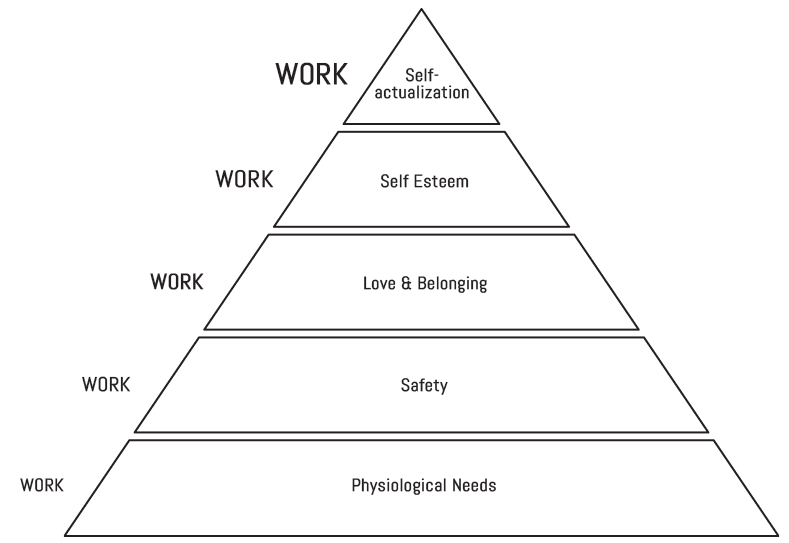In my first essay on Work (with a capital W), I presented the notion that work is essential for scaling Maslow’s pyramid of Needs, that work helps us understand what we like, what we’re good at doing, what kinds of people we enjoy working with, what matters to us, etc.
In this essay, I want to unpack a bit more about what Work is and isn’t and a couple of suggestions regarding how to best manifest Work.

Work (with a capital W), just like each of us, is quite uniquely a personal thing.
Work (with a capital W), just like each of us, is quite uniquely a personal thing.
For some of us, Work is building a company. For others, teaching. For others, coaching. For others, writing. For others, it’s playing a sport (aka professional athletes). For others, it’s building things like houses, furniture, computers, fences or cars. For others, it’s designing. For others, it’s protecting. For others, it’s fishing. For others, it’s caring for others. For others, investigating. For others, writing songs, singing or playing an instrument. For others, researching. For others, flying a plane. For others, cooking. For others, publishing or teaching. For others, painting. For others, writing code. For others, doing an array of very different but complimentary things (aka polymaths).
We could go on and on and on.
My hope is I’ve made it clear that Work can be almost anything you not only love to do but something others value so much that you get to be paid for doing that thing you do so well.
Work can be almost anything you not only love to do but something others value so much that you get to be paid for doing that thing you do so well.
Work (with a capital W) is always done for others and with others. If it’s done solely for yourself, and if it involves no one else, then hopefully it’s done for you or to help you because you’re paying for that thing with your time.
The Art and Energy of Work
One of things I’ve noticed about Work is you can see it.
You know when you’re doing it.
You know when someone else is doing it and/or has done it.
I can’t quite explain it. It radiates energy. You can feel the pride… the craftsmanship… the soul. Below is a picture of me finishing some Work.

Humor me as I go, what my wife calls, “woo woo” on you for a second. I occasionally paint. Some of the pieces aren’t very good, in my opinion. That said, of the pieces I felt compelled to paint, those pieces have a certain “je ne sais quoi” that I cannot explain. I’m not a trained painter, but they’re actually not bad (below is a picture with one piece I love and another I think is just ok). People genuinely like some of my art Work. The best pieces each have a story. They have a purpose. They have an essence that makes them Work (aka Works of Art).

Allow me another personal example.
I’m a fledgling writer. The irony is that I have a form of dyslexia, and the truth is that writing is hard for me. It takes me draft after draft after draft to create something that Works for me. After sixty plus years of living, and over fifty of working (and Working), I’ve got so much I want to share through writing and I’ve tried to get help with getting my thoughts onto paper. One of my persistent issues is that every time I’ve attempted to create the Works I’m envisioning through another person (i.e., leveraging a ghost writer), the effort has failed. It’s not that they cannot write. They can — that’s what they do for a living — and I have a pretty good track record in terms of hiring talented people. No, it has nothing to do with them or my hiring abilities. It has to do with the fact that they can’t do my Work.
They can’t frame an idea the way I want to frame it. They don’t have access to the words that Work for me… my tone… my alliteration… my sense for the proper depth of an idea… for that specific thought in just that place… knowing what’s necessary or best to be expanded upon later. More to the point, when I read their words, I don’t read my words. I don’t feel the essence of what I’m trying to convey. What I find myself reading just doesn’t seem to work. It’s not my Work and it’s fairly clear it’s not their Work.
If you read this far, I’m fairly confident you get what I’m trying to convey. You know when you’re proud of your Work. You know when you’ve hit your aim. You know when it’s done, and done right. You know when your Work is ready for others to have, to consume, to enjoy, to depend on, to buy, etc.
You know when you’re proud of your Work.
You know when you’ve hit your aim.
In my opinion, the consumer knows it too. If it is work (with a lowercase w, which may be defined as what we “have” to do as opposed to what we “get” to do), we can see it. We can smell it. We can taste it. This is just one of the reasons we fail ourselves and others when we try to micromanage people, or worse, take their work from them and do it ourselves.
Each of us is extraordinarily unique, and so is and will be our Work. The best of us have a goal/need, and if we want/need someone else to fulfill it, we must let them do their Work. If their Work doesn’t hit the mark, it is likely either about us (because we weren’t clear) or them (because they weren’t capable of doing it, or didn’t want to do it, or didn’t have the capacity to do it).
Either way, it’s always because we didn’t set the proper stage for Work.
The best of us have a goal/need, and if we want/need someone else to fulfill it, we must let them do their Work.
One of the many things I suspect will happen as people read my series of essays on Work is they will assume I’m pushing people just to work. Some may believe I’m pedaling a get-rich-quick series, or a success series, or a grow-fast series, or here’s-how-to-kill-your-competition series, or how-to-increase-our-GDP series or how-to-get-people-to-work-harder series.
None of those are remotely true.
My aim is to help more and more people live meaningful, productive lives
My aim is to help more and more people live meaningful, productive lives… to do great Work… to see that taking care of themselves and others is essential for doing great Work… to take the time to do great Work… to not try to do too much work so that all we produce is work (lowercase w)… to seek out and embrace Work… to be proud of the Work we do… to do Work that’s meaningful… to do Work that matters… to do Work that makes life better… to recognize that work is an essential part of Life… and that Work is an essential part of achieving self-esteem and ultimately self-actualization.
Until next time, may you lead, listen and Work with confidence and humility.
Executive Summary
- Work (with a capital W) is unique to each individual.
- Work can be almost anything you love to do — something others value so much that you get to be paid for doing that thing you do so well.
- If it is work (with a lowercase w), we can see it. We can smell it. We can taste it. It lacks the essence, art and energy of true Work.
- When we have a goal or need, and if we want or need someone else to fulfill it, we must let them do their Work. We fail ourselves and others when we try to micromanage people, or worse, take their work from them and do it ourselves.
- The essence of Work takes many forms, each worthy of recognition.
Action Steps
- Consider what Work energizes you, then find ways to do more of it.
- If you lead others, find out what Work they love to do. Find more ways to incorporate their gifts of Work into what they do.
- Seek out opportunities to set the stage for Work, to set people up for a positive experience.
- People take great pride in their Work. Acknowledge them for doing so.



